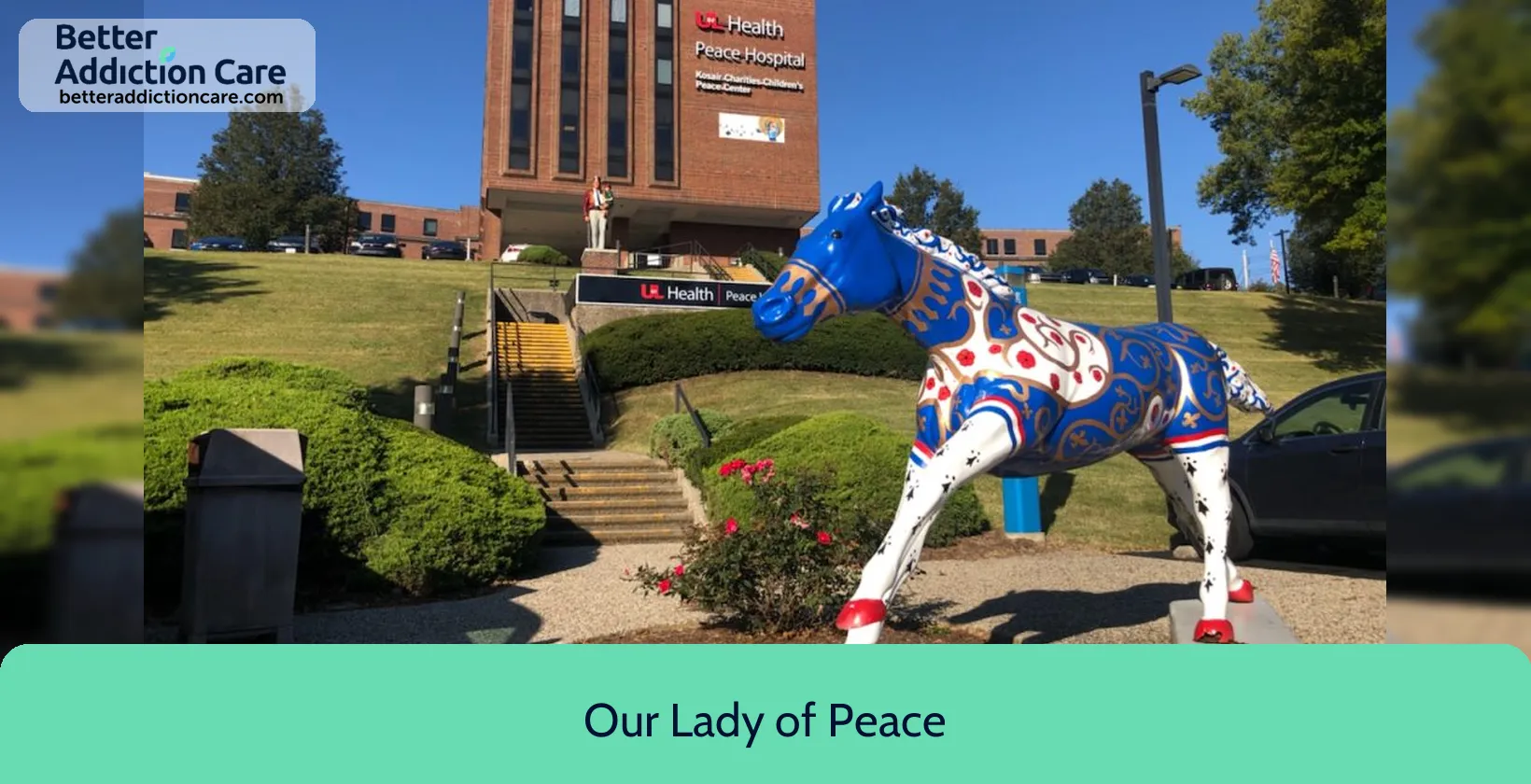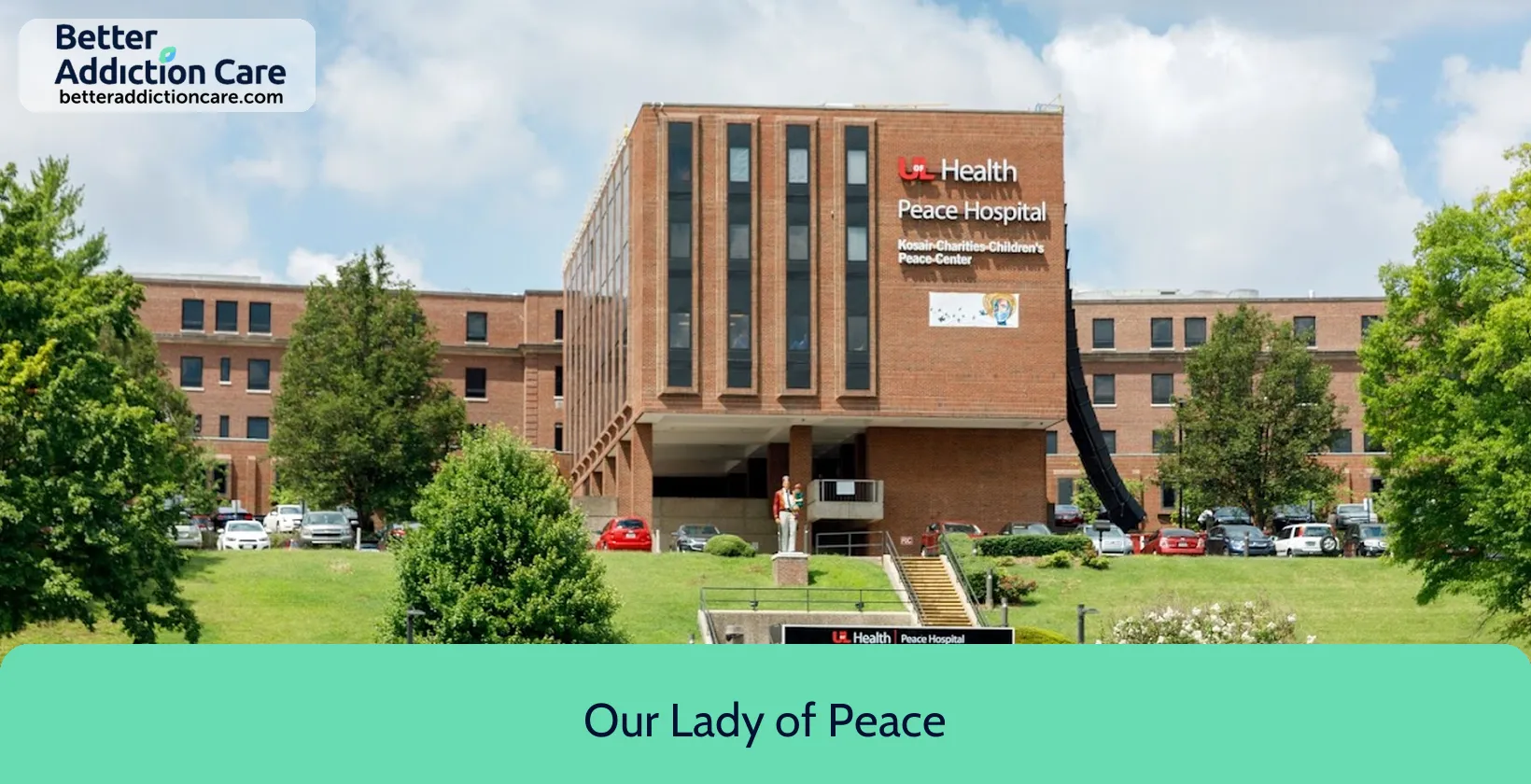Our Lady of Peace
Overview
Peace Hospital, a healthcare facility in Louisville, Kentucky, was established in 1951. It is a member of UofL Health and has 363 licensed beds. The facility offers specialized treatment for children, adolescents, and adults. Peace Hospital is distinguished by its comprehensive services, which encompass mental health care, substance use disorder treatment, and specialized facilities for adolescents and children with developmental and intellectual disabilities.
The primary services and programs for adults are adult inpatient programs where there is medical detoxification, psychiatric crisis stabilization where there is immediate intervention for individuals who are exhibiting severe psychiatric symptoms. Another service provided is aftercare and Family Support.
The inpatient program comprises individual and group therapy, as well as 12-Step Meetings. The multidisciplinary team of psychiatrists, nurses, counselors, and therapists collaborates to provide personalized and patient-centered treatment plans that are specifically designed for the unique circumstances of each patient.
Peace Hospital provides a variety of ambulatory services to individuals who require ongoing care while still retaining a degree of independence, such as the Partial Hospitalization Program (PHP), which is a structured program that operates from Monday to Friday at from 9:00 AM to 13:30 PM for individuals who require a higher level of care than traditional outpatient services but do not necessitate a 24-hour monitored environment.
Another service provided is Intensive Outpatient Program (IOP) that provides individuals with mental health and substance use disorders with flexible treatment options, and it is accessible during both morning and evening hours. IOP emphasizes the importance of consistent therapy sessions in the prevention of relapse and the continuation of recovery.
Telehealth Services: Peace Hospital provides telehealth options for outpatient care to enhance accessibility, enabling individuals to receive therapy and support remotely. This ensures that progress is maintained even when physically attending in person is not feasible.
Our Lady of Peace at a Glance
Payment Options
- Cash or self-payment
- Private health insurance
- Medicare
- Medicaid
- Military insurance
Age Groups
- Adults
- Young adults
- Children/adolescents
- Seniors
Amenities
- Private rooms
- Residential setting
- Art activities
Highlights About Our Lady of Peace
6.80/10
With an overall rating of 6.80/10, this facility has following balanced range of services. Alcohol Rehabilitation: 8.00/10, Drug Rehab and Detox: 6.00/10, Insurance and Payments: 6.00/10, Treatment Options: 7.21/10.-
Alcohol Rehabilitation 8.00
-
Treatment Options 7.21
-
Drug Rehab and Detox 6.00
-
Insurance and Payments 6.00
Treatment At Our Lady of Peace
Treatment Conditions
- Co-occurring Disorders
- Substance use treatment
- Mental health treatment
- Alcoholism
Care Levels
- Outpatient
- Detoxification
- Intensive outpatient treatment
- Long-term residential
- Aftercare
Treatment Modalities
- Cognitive behavioral therapy
- Creative Arts Therapy
- Dialectical behavior therapy
- Electroconvulsive therapy
- Family counseling
Common Questions About Our Lady of Peace
Contact Information
Our Lady of Peace Reviews
I've been to other rehab facilities in nursing homes in this place by far is one of the best ones I've been in this area everyone is very friendly and approachable the place is clean and the food looks is good. PT is doing a great job with my family member. They deserve a five-star review
Read our Most Recent Article About Drug Addiction
DISCLAIMER: The facility name, logo and brand are the property and registered trademarks of Our Lady of Peace, and are being used for identification and informational purposes only. Use of these names, logos and brands shall not imply endorsement. BetterAddictionCare.com is not affiliated with or sponsored by Our Lady of Peace.










